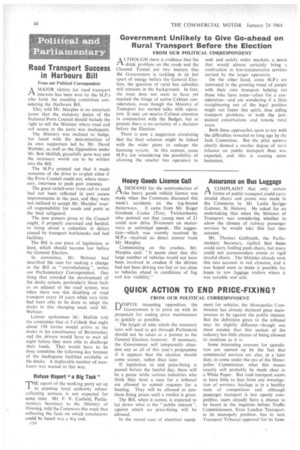Road Transport Success in Harbours Bill
Page 50

If you've noticed an error in this article please click here to report it so we can fix it.
From our Political Correspondent
A MAJOR victory for road transport interests has been won by the M.P.s who form the standing committee considering the Harbours Bill.
They told Mr. Marples in no uncertain terms that the statutory duties of the National Ports Council should include the right to tell the Minister where road and rail access to the ports was inadequate.
The Ministry was inclined to hedge, but faced with the determination of its own supporters led by Mr. David Webster, as ,well as the Opposition under Mr. Bob Mellish, gracefully gave way and the necessary words are to be written into the Bill.
The M.P.s pointed out that it made nonsense of the drive to re-plan cities if the Ports Council could not, where necessary, intervene to push port interests.
The great switch-over from rail to road had not been reflected in port access improvements in the past, and they were not inclined to accept Mr. Marples' overall responsibility for roads and ports as the final safeguard.
The new powers given to the Council ought, if properly exercised and heeded, to bring about a reduction in delays caused by transport bottlenecks and bad facilities.
The Bill is one piece of legislation, at least, which should become law before the General Election.
In committee, Mr. Webster had described the case for making a change in the Bill as "overwhelming ", writes our Parliamentary Correspondent. One thing that retarded the development of the docks system, particularly those built as an adjunct to the road system, was when there was this doubling of road transport every 10 years while very little had been able to be done to adapt the docks to this changing need, said Mr. Webster.
Labour spokesman Mr. Mellish told the committee that at 5 o'clock that night about 150 lorries would arrive at the docks in his constituency of Bermondsey and the drivers would have to wait all night before they were able to discharge their loads. That would have to be done sometime the following day because of the inadequate facilities available at the docks. A deplorable number of manhours was wasted in this way.
Refuse Report "a Big Task" THE report of the working party set up to examine local authority refusecollecting services is not expected for some time. Mr. F. V. Corfield, Parliamentary Secretary to the Ministry of Housing, told the Commons this week that collecting the facts on which conclusions could be based was a big task.
c14
























































































































